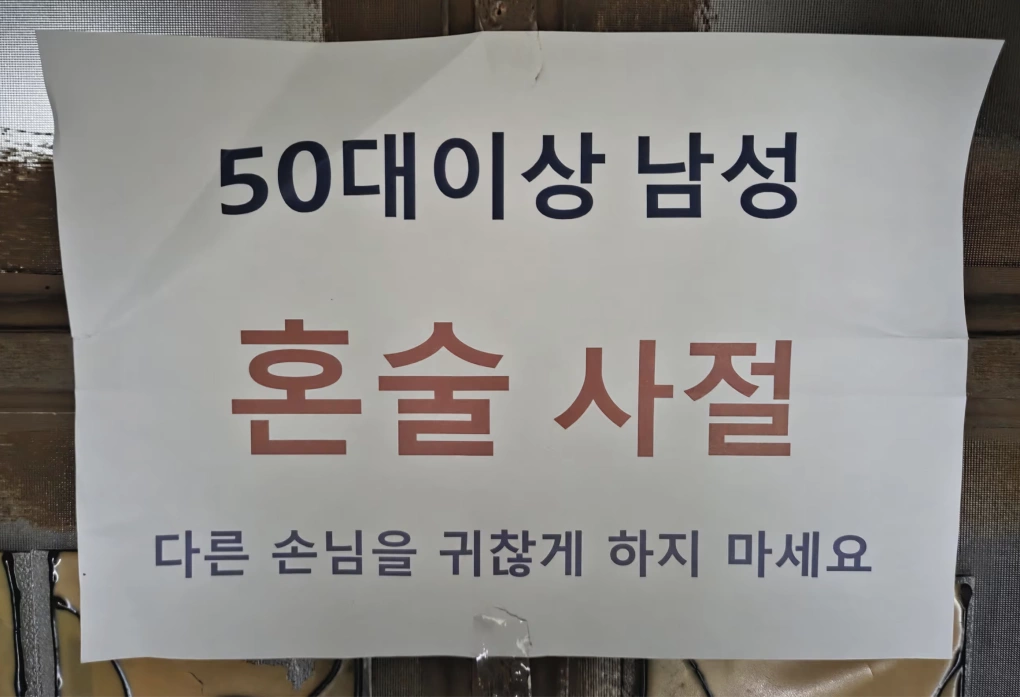[Reading level: B2 – Upper Intermediate]
A sign reading “Men over 50 are prohibited from drinking alone” hangs right at the entrance of a bar near Chungmuro Station, Seoul.
Inside are other warnings such as “If noisy, all men from 50 years old must leave”, “Do not talk to young customers at the next table.” Notably, the bar owner himself is also a man in this age group.
Two months ago, a bar in Ulsan also stirred controversy with a notice saying “Middle-aged Korean men from 50 years old are not served.” Many people expressed sympathy for the owner. “No need to hear the details to understand why,” one comment read.
The 30-year-old bar owner explained that this group of customers often use coarse language, are noisy, and smoke indoors. At another rock music venue, the manager said most of the troublemakers—whether demanding songs by singer Lim Young-woong or getting drunk and starting fights—belonged to this age group.

Men in their 50s are the largest demographic group in South Korea, with about 8.7 million people, accounting for 17% of the population.
They belong to the generation that entered the labor market during the peak of South Korea’s economic boom, often holding important positions and being accustomed to a superior attitude, seeing it as a way to assert their status. A few years ago, a pub near Pusan National University once posted a sign “Professor-prohibited area” with the message “If you have entered, please do not loudly reveal your identity.”
But the golden age of this demographic group has passed.
According to Statistics Korea, people in their 50s account for the highest proportion (21%) of suicide cases in the country, with men twice as many as women. This reality reflects the tragedy of a generation on the downhill slope of life, simultaneously facing retirement, declining health, loss of status, and the burden of family responsibilities. The employment rate of the 50-year-old group has fallen for 16 consecutive months.
Caught between the young and the elderly, middle-aged South Korean men are losing direction, unable to let go of the past or easily start over. They turn to alcohol, boasting and shouting in loneliness.
According to the Shinhan Card Big Data Research Institute of Korea, depression and apathy were the most common reasons for mental health consultations among people from age 50 in the first half of this year. Psychological pressure has led many to become talkative or display unusual behavior. Their troublesome actions may actually be a cry for help, but are met with rejection and stigma from society.
Source: https://vnexpress.net/nhung-ong-chu-50-bi-xua-duoi-4936456.html
WORD BANK:
prohibit /prəˈhɪb.ɪt/ [B2] (v): cấm
notably /ˈnoʊ.t̬ə.bli/ [C1] (adv): đáng chú ý
stir controversy /stɝː ˈkɑːn.trə.vɝː.si/ [C1] (v): gây tranh cãi
middle-aged /ˌmɪd.əlˈeɪdʒd/ (adj): trung niên
coarse language /kɔːrs ˈlæŋ.ɡwɪdʒ/ (n): ngôn từ thô tục
venue /ˈven.juː/ [B2] (n): địa điểm tổ chức
troublemaker /ˈtrʌb.əlˌmeɪ.kɚ/ (n): kẻ gây rắc rối
demographic group /ˌdem.əˈɡræf.ɪk ɡruːp/ (n): nhóm nhân khẩu học
the labor market /ðə ˈleɪ.bɚ ˈmɑːr.kɪt/ [C1] (n): thị trường lao động
the peak of sth /ðə piːk əv/ (n): đỉnh điểm của cái gì
economic boom /ˌek.əˈnɑː.mɪk buːm/ [C1] (n): sự bùng nổ kinh tế
accustomed to sth /əˈkʌs.təmd tuː/ [C1] (adj): quen với điều gì
superior attitude /suːˈpɪr.i.ɚ ˈæt̬.ə.tuːd/ (n): thái độ bề trên
assert one’s status /əˈsɝːt wʌnz ˈsteɪ.t̬əs/ [C1] (v): khẳng định địa vị của mình
pub /pʌb/ [B1] (n): quán rượu
reveal /rɪˈviːl/ [B2] (v): tiết lộ
identity /aɪˈden.t̬ə.t̬i/ [B2] (n): danh tính
suicide /ˈsuː.ə.saɪd/ [B2] (n): sự tự tử
tragedy /ˈtrædʒ.ə.di/ [B2] (n): bi kịch
on the downhill slope of life /ɒn ðə ˈdaʊn.hɪl sloʊp əv laɪf/ (idiom): ở giai đoạn đi xuống của cuộc đời
simultaneously /ˌsaɪ.məlˈteɪ.ni.əs.li/ [C1] (adv): đồng thời
status /ˈsteɪ.t̬əs/ [B2] (n): địa vị
consecutive /kənˈsek.jə.t̬ɪv/ [C1] (adj): liên tiếp
let go of sth /let ɡoʊ əv/ (v): buông bỏ cái gì
boast /boʊst/ [B2] (v): khoe khoang
shout /ʃaʊt/ [A2] (v): hét, la
depression /dɪˈpreʃ.ən/ [B2] (n): trầm cảm
apathy /ˈæp.ə.θi/ [C1] (n): sự thờ ơ
consultation /ˌkɑːn.səlˈteɪ.ʃən/ [C1] (n): sự tư vấn
display a behavior /dɪˈspleɪ ə bɪˈheɪ.vjɚ/ (v): cho thấy hành vi nào đó
troublesome /ˈtrʌ.bəl.səm/ [C1] (adj): rắc rối
a cry for help /ə kraɪ fər help/ (n): tiếng kêu cứu
be met with sth /bi met wɪð/ (v): gặp phải điều gì (thường là phản ứng tiêu cực)
rejection /rɪˈdʒek.ʃən/ [B2] (n): sự từ chối
stigma /ˈstɪɡ.mə/ [C1] (n): sự kỳ thị
ỦNG HỘ READ TO LEAD!
Chào bạn! Có thể bạn chưa biết, Read to Lead là một trang giáo dục phi lợi nhuận với mục đích góp phần phát triển cộng đồng người học tiếng Anh tại Việt Nam. Chúng tôi không yêu cầu người đọc phải trả bất kỳ chi phí nào để sử dụng các sản phẩm của mình để mọi người đều có cơ hội học tập tốt hơn. Tuy nhiên, nếu bạn có thể, chúng tôi mong nhận được sự hỗ trợ tài chính từ bạn để duy trì hoạt động của trang và phát triển các sản phẩm mới.
Bạn có thể ủng hộ chúng tôi qua 1 trong 2 cách dưới đây.
– Cách 1: Chuyển tiền qua tài khoản Momo.
Số điện thoại 0947.886.865 (Chủ tài khoản: Nguyễn Tiến Trung)
Nội dung chuyển tiền: Ủng hộ Read to Lead
hoặc
– Cách 2: Chuyển tiền qua tài khoản ngân hàng.
Ngân hàng VIB chi nhánh Hải Phòng
Số tài khoản: 012704060048394 (Chủ tài khoản: Nguyễn Tiến Trung)
Nội dung chuyển tiền: Ủng hộ Read to Lead
Lớp luyện thi IELTS online
Bạn đang có nhu cầu thi chứng chỉ IELTS cho đầu vào đại học, đi du học, xin việc hay xin cư trú và đang phân vân chưa biết học ở đâu?
Nếu bạn đang tìm kiếm dịch vụ luyện thi IELTS online với giáo viên uy tín và chất lượng, cũng như học phí phải chăng, thì thầy Trung và Cô Thủy (Admin và dịch giả chính của Read to Lead) có thể là một lựa chọn phù hợp dành cho bạn.
Hãy liên hệ (nhắn tin) tới trang Facebook cá nhân của mình (https://www.facebook.com/nguyen.trung.509) để tìm hiểu về lớp học và được tư vấn cũng như được học thử nha!





